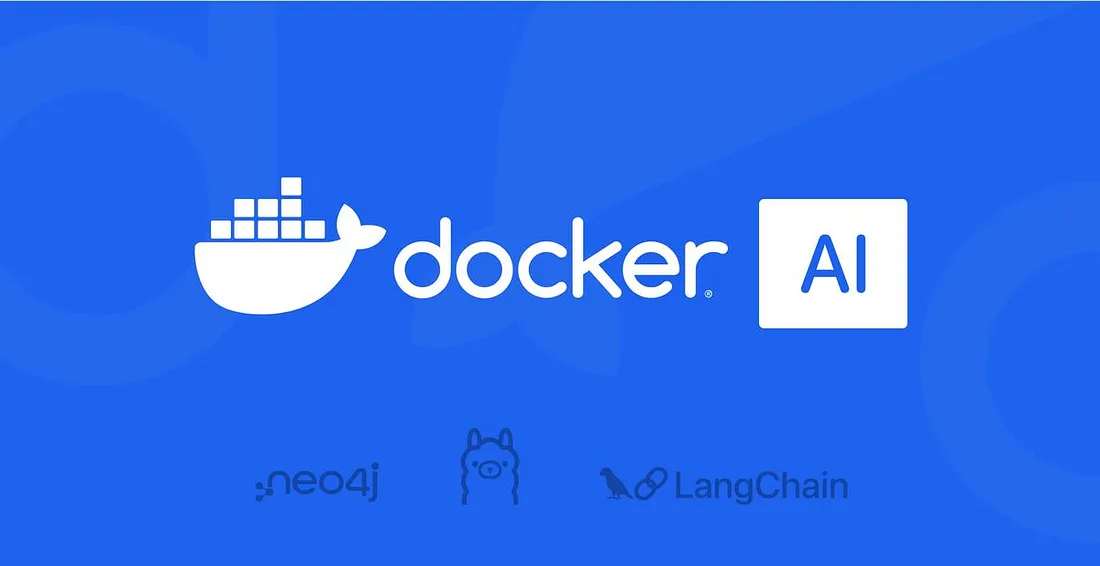Docker Launches AI Framework to Simplify Application Development
Bron: artikel integraal overgenomen van Medium
Origineel auteur: Seifeddine Rajhi

Docker, Inc. has announced At DockerCon 2023, with partners Neo4j, LangChain, and Ollama, that they launched a new framework aimed at simplifying the process of building applications infused with artificial intelligence (AI) using containers.
The framework, called Docker AI, provides developers with automated guidance and context-specific recommendations to help them define and troubleshoot all aspects of AI application development. Additionally, Docker has partnered with Neo4j, LangChain, and Ollama to create a GenAI Stack, which includes pre-configured Large Language Models (LLMs) and tools to streamline AI/ML integration, making it more accessible to developers.
Docker’s AI Initiative:
With Docker AI, developers can benefit from the collective wisdom of the millions of developers using Docker, allowing them to spend more time focused on their app and less on tools and infrastructure.
Additionally, Docker has partnered with Neo4j, LangChain, and Ollama to create a GenAI Stack, which includes pre-configured Large Language Models (LLMs) and tools to streamline AI/ML integration, making it more accessible to developers.
These initiatives are designed to make AI application development a team sport, involving data scientists, data engineers, software engineers, and traditional developers.
By leveraging Docker’s AI tools, developers can enhance their productivity and accelerate innovation in AI application development.
GenAI Stack: AI/ML Integration:
The GenAI Stack, introduced by Docker, is a comprehensive set of tools designed to simplify AI/ML integration, making it more accessible to developers. This initiative, announced at DockerCon 2023, is a collaborative effort with partners Neo4j, LangChain, and Ollama, and it includes the following key components:
-
Pre-configured LLMs: The GenAI Stack provides preconfigured Large Language Models (LLMs), such as Llama2, GPT-3.5, and GPT-4, to jumpstart AI projects.
-
Ollama Management: Ollama simplifies the local management of open-source LLMs, streamlining the AI development process.
-
Neo4j as the Default Database: Neo4j serves as the default database, offering graph and native vector search capabilities to enhance the speed and accuracy of AI/ML models. It also acts as a long-term memory for these models.
-
LangChain Orchestration: LangChain facilitates communication between the LLM, applications, and the database, along with a robust vector index. LangChain serves as a framework for developing applications powered by LLMs, including LangSmith, a tool for debugging, testing, evaluating, and monitoring LLM applications.
-
Comprehensive Support: The GenAI Stack provides a range of helpful tools, code templates, how-to guides, and best practices to support developers on their AI journey. Docker encourages developers to participate in the Docker AI/ML Hackathon to showcase their creative AI/ML solutions built on Docker.
Docker AI: Context-Specific Recommendations:
Docker AI is an innovative tool that harnesses the collective knowledge of Docker developers worldwide, offering context-specific, automated guidance to streamline development processes.
This AI-powered product, available in early access, aims to simplify tasks and boost developer productivity by providing targeted, automated advice to developers as they modify Dockerfiles or Docker Compose files, debug ‘docker build’ processes, or conduct local tests.
Docker AI excels in providing:
-
Targeted, automated advice: The tool leverages the wealth of knowledge amassed by millions of Docker users over a generation, offering best practices and recommending secure, up-to-date images for their applications.
-
Debugging and local testing: Docker AI provides guidance during local docker build debugging and local testing, helping developers navigate the complexities of application composition with the support of a vast and experienced community.
-
Continuous updates: Docker AI continually updates its recommendations based on the feedback loops created by organizations, ensuring that developers have access to the most current information and best practices.
By leveraging AI-driven insights, Docker AI aims to revolutionize the way developers approach application development, empowering them to devote more time to refining their applications rather than getting bogged down by complex tasks.
This forward-looking tool not only promises to advance the realm of application development but also streamline the integration of AI/ML into developers’ projects, making it more accessible and straightforward for developers. to ensure they meet specific security standards. It saves time, reduces the risk of oversight and ensures that every aspect of the infrastructure is scrutinized effectively.
Docker’s Commitment to Democratizing AI:
Docker AI aims to meet developers where they are by integrating AI into existing developer workflows, making it more accessible and efficient for developers to work with AI and machine learning technologies.
The rapid proliferation of AI models is making integration accessible to more developers, and Docker’s innovation reflects its commitment to democratizing AI and machine learning.
Key aspects of Docker’s commitment to democratizing AI include:
-
GenAI Stack: This pre-configured solution combines technologies and tools from Docker and partners Neo4j, LangChain, and Llama, providing a streamlined AI/ML integration process.
-
Docker AI: Docker’s first AI-powered product leverages collective wisdom from millions of Docker developers to generate context-aware insights and guidance for developers.
-
Accelerated AI/ML Development: Docker simplifies and accelerates AI/ML development workflows, allowing developers to spend less time on environment setup and more time coding.
-
Reproducibility: Docker ensures that AI/ML models and environments are identical for each deployment, providing a consistent setup and deployment process to produce accurate results.
-
Security: Docker provides trusted content, enhanced isolation, registry access management, and Docker Scout to deliver a secure environment for developer teams.
Conclusion:
Docker’s introduction of Docker AI is a significant step towards helping developers work more efficiently. By using AI-driven insights, Docker aims to revolutionize the way developers approach application development. With Docker AI, developers can confidently navigate the complexities of application composition, supported by the collective wisdom of a vast and experienced community.
This innovative tool not only promises to advance the realm of application development but also paves the way for further innovation in the AI-driven developer landscape.
